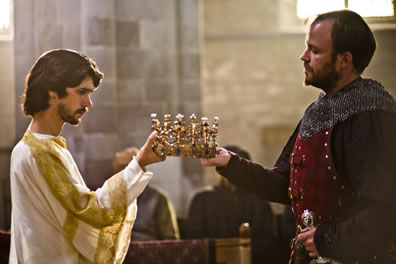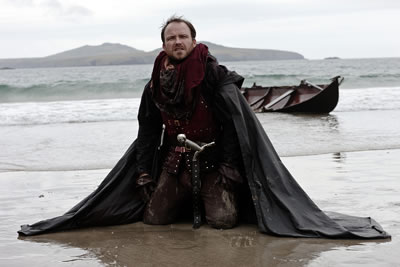The Hollow Crown: Richard II
This Crown Jewel Is a Hollow Richard
Neal Street Productions, NBC/Universal International, WNET THIRTEEN (2012)
Directed by Rupert Goold. Ben Whishaw, Rory Kinnear, Patrick Stewart, David Suchet, David Morrissey, Clémence Poésy, James Purefoy, Lindsay Duncan.

Richard II (Ben Whishaw) reluctantly relinquishes the crown to Bolingbroke (Rory Kinnear) in Richard II. Below, Bolingbroke returns to England from his banishment. Richard II is the first of four Shakespeare history plays comprising The Hollow Crown airing on PBS stations this fall. Photos by Nick Briggs, Neal Street Productions.
The broadcast that will air on PBS Friday, Sept. 20, kicking off four consecutive Fridays of William Shakespeare history plays, goes by three titles: Great Performances is the long-running WNET program for which this BBC-produced series of films has been packaged; that four-part package is called The Hollow Crown; and each installment carries the original play's title, starting with Richard II and running through the Prince Hal trilogy of Henry IV plays and Henry V. (Check local listings for broadcast dates and times.)
In this first offering, director Rupert Goold is more focused on the series' thematic title than Shakespeare's purposes, for while this is a great presentation of a play that could easily be called The Hollow Crown, it's a somewhat hollow presentation of the actual play called Richard II. However, even if your Shakespearean sensibilities cause you to cringe at various points of the broadcast, the overriding takeaway from watching it is summed up in the title of the framework series: great performances.
Never mind that Gaunt's "This Sceptered Isle" speech is stripped of its context: Patrick Stewart's delivery of it is a Michelangelo painting. Never mind that Richard's Pomfret scene is misplaced and filmed in almost total darkness: Ben Whishaw delivers his lines straight to your soul. Never mind that Bolingbroke is totally misrepresented in this production: Rory Kinnear acts the part with such superb subtlety that even his moments of silence could comprise the curriculum of master classes in acting. From David Suchet's perfectly balanced presentation of the Duke of York to David Morrissey's malevolently calculating Northumberland, from Clémence Poésy's finely tuned fragility as Isabelle to David Bradley's and Simon Trinder's colloquial but succinct conversation as the gardeners, this production scores a 100 in the acting category.
And never mind that Goold butchers Shakespeare's play, he scores points for the cinematic quality of the production, with tight close-ups on details such as sword hilts, clenched gages, and jewels in the crown, with dramatic camera angles and tracking shots (cinematographer Danny Cohen), with thematically apt lighting (production designer Andrew McAlpine) and rich costuming (designer Odile Dicks-Mireaux), and with effective visual imagery (art direction by Jane Harwood and Ben Smith). This is a gorgeous production of Richard II.
Well, actually I do mind his butchery, some of which stems from intention of tone, some of which might be quibbling (or maybe not), and some of which is ill-advised alteration of the plot. Shakespeare's dry wit that runs through this most poetic of his plays has been banished. The gage-casting scene in Parliament is gone. The York-begging scene with Suchet, Lindsay Duncan's Duchess, and Tom Hughes's Aumerle, all on their knees and speaking rhyming couplets, is presented in total seriousness. Other comic lines have either been trimmed or tinged with fatalistic readings. Despite this butchery, the broadcast still clocks in at 2:18, but with additions of such scenes as Bolingbroke and Mowbray (James Purefoy) practicing for their joust, Isabelle en route to France after Richard's deposition, and a domestic scene in which Richard watches the painting of a portrait of St. Sebastian, patron saint of archers and holy death, with three arrows piercing his bare torso.
All the lines are Shakespeare's, but some key words have been changed. John of Gaunt dies at Lancaster Castle, not in London's Ely House. The blubbering Bushy and Green are also beheaded at Lancaster Castle (their heads plopping into the water below), not at Bristol. Richard is sent to the Tower and not detoured to Pomfret after his abdication. Call this quibbling or of no consequence to many viewers, but you have to ask why Goold bothered with these geographical switches. That last one is significant in that the Tower was a prison, but Pomfret was, for political purposes, not considered a prison, and the Queen's request to join Richard—which Whishaw's king denies with silence rather than the poetical realism of the original—would then be more poignant than plaintive. Meanwhile, Lancaster becomes a sort of Mordor, a place where bad things happen, from Gaunt's death and Richard's ill-advised decision to seize his properties to foolish men being murdered most cruelly.
That, then, is not a quibbling matter, especially as this production cuts all mention of Woodstock's murder, the late Duke of Gloucester and protector upon the young Richard's ascension to the throne. It is this conspiracy—the actual murder, even—that Bolingbroke accuses Mowbray of in the opening scene, an accusation that further touches the king himself. Trying to get past the political fallout of this thorny Gloucestergate is why Richard banishes Bolingbroke for only 10 years—thereby gaining time to chip away at the power of his Plantagenet uncles and cousins—but banishes Mowbray for life, getting rid of him without actually executing him for a deed that Richard desired him to do. This is the underlying circumstance of Richard II's plot. By completely excising this matter from his production, Goold turns Bolingbroke into a purely Machiavellian politician, slandering an innocent Mowbray en route to his ultimate designs to take down the king. Meanwhile, Mowbray comes across as a heroic victim of political forces beyond his control, not the real traitor that Bolingbroke's uncles and aunt (Woodstock's widow) wanted exposed, with the further goal of forestalling Richard's bankrupting England.
This fact is the gist of the "Sceptered Isle" speech. John of Gaunt, Bolingbroke's father, is on a rant about the damage Richard is doing to the nation, and the sceptered isle portion isn't so much a speech as a tangent in a single sentence that begins with "This royal throne of kings…" and ends with "…Is now leased out, I die pronouncing it, like to a tenement or pelting farm." The series of adjectival phrases describing England's greatness is the aged Gaunt caught up in his own frenzied thinking. Stewart plays this as a reverie, his face softening into a reminiscent glow, his cadence slowing as his rich voice honors each phrase while a dramatic musical score wells up below. It's a "here's the famous speech" presentation but, well, it's Stewart doing it and it's a legitimately famous rendering of this famous speech, nonetheless.
Goold doesn't seem to let Richard off the hook, though. Whishaw plays the king with a touch of attention deficit disorder, his concentration easily distracted by his pet monkey, and he skips from a devout meditation on Gaunt's death to robbing the dead man's son of his entire inheritance with a flippant, "So much for that." This Richard is very much aware of his divine right to the point that he presents himself as a Christ-like figure. Sitting on his throne in white robes and glowing light, with well-trimmed beard, he appears like the ubiquitous painting of Jesus that hangs over many a mantelpiece. He returns from Ireland, wading through the surf onto the beach, with his scepter like a staff and dressed like a Palestine prince. In the Parliament scene, he enters barefoot and wearing a gold-trimmed white robe like Jesus before Pilate (and he even references himself as Christ in this scene).
From this point, though, the Christ imagery seems to shift from being Richard's own comparison to the contention of Goold himself. At Pomfret, er, the Tower, when we finally see Richard in the lightless room, he's wearing a white loin-cloth around his waist, such that Jesus would wear as he's nailed to the cross. The movie's last visual has Richard in his narrow coffin with knees bent to the side, and as the camera tracks up overhead the scene resembles a stained-glass-window tableaux of Jesus laid in his grave. Just in case you don't get the point then, the camera next pans up to the carved crucifixion scene hanging from the cathedral ceiling.
This Richard, though, is not heroic for the first two-thirds of the play. Whishaw is marvelous with the verse, but even in his great speeches upon his return from Ireland, his Richard is still indulging in immature pettiness. When Northumberland and Bolingbroke come to him at Flint Castle, Richard is seated as a sun god enthroned on the battlements with trumpeting angels behind him, and thus his speech about the dangers of disrupting divinity comes off as delusional rather than studied. When he decides to abdicate, he does so abruptly among his advisors, not rashly before Northumberland, and then he speaks what seems to be the character's pivotal line in this production: "O that I were as great as my grief, or lesser than my name! Or that I could forget what I have been, or not remember what I must be now!" he admits to Aumerle.
With this line, Whishaw's Richard suddenly settles into an air of awareness and a posture of confidence. "Set on towards London, cousin, is it so?" he says to Bolingbroke, and as Richard strolls off camera, we are left with Bolingbroke watching after him with a puzzled look that mingles in some genuine awe and a creeping fear that the script is suddenly out of his hands.
 The production's highpoint is the abdication scene in Parliament. Whishaw's Richard is firmly in control—ironically, at the very moment he has zero political power—and he gets his proof when he shouts "God save the King," and we see all the nobles, including those who supported Bolingbroke on his drive to the crown, sit uncomfortably silent. The line "Here cousin, seize the crown" is the home run moment for any actor playing Richard, but Whishaw takes it further when he speaks the follow-on "Here cousin" as if he were offering Bolingbroke a doggie treat. As the two hold each side of the crown and Richard describes it "like a deep well," the camera shoots from below through the crown framing the two kings' faces. Later, the mirror Richard holds is set in a frame of jewels so that his face again appears surrounded by a crown. When he finally relinquishes the crown, Whishaw's Richard falls to his knees and scoots the crown across the floor to Bolingbroke's feet. Then Whishaw, with "nothing have, with nothing grieved," lies back so that his own head is at Bolingbroke's feet, and the crown itself now seems to hover in the air above him. In one final, hollow crown imagery, Richard's travel to the Tower as the townspeople pelt him with garbage is filmed inside a castle turret which, as the camera pans up to the top, segues into the crown floating in air.
The production's highpoint is the abdication scene in Parliament. Whishaw's Richard is firmly in control—ironically, at the very moment he has zero political power—and he gets his proof when he shouts "God save the King," and we see all the nobles, including those who supported Bolingbroke on his drive to the crown, sit uncomfortably silent. The line "Here cousin, seize the crown" is the home run moment for any actor playing Richard, but Whishaw takes it further when he speaks the follow-on "Here cousin" as if he were offering Bolingbroke a doggie treat. As the two hold each side of the crown and Richard describes it "like a deep well," the camera shoots from below through the crown framing the two kings' faces. Later, the mirror Richard holds is set in a frame of jewels so that his face again appears surrounded by a crown. When he finally relinquishes the crown, Whishaw's Richard falls to his knees and scoots the crown across the floor to Bolingbroke's feet. Then Whishaw, with "nothing have, with nothing grieved," lies back so that his own head is at Bolingbroke's feet, and the crown itself now seems to hover in the air above him. In one final, hollow crown imagery, Richard's travel to the Tower as the townspeople pelt him with garbage is filmed inside a castle turret which, as the camera pans up to the top, segues into the crown floating in air.
Hughes plays Aumerle as a young man idolizing Richard, in contrast to the other courtiers who flatter Richard out of their own self-interest. This drives Aumerle to his involvement in the plot to assassinate Bolingbroke, and his sense of duty is then easily swayed when the newly crowned Henry IV pardons him (even before his own or his mother's supplication, actually). This does not go far enough to explain Goold's final mangling of Shakespeare's text, replacing assassin Exton's servant with Aumerle and having him not only participate in Richard's murder, but firing the first arrow.
Three arrows in all pierce Richard's torso, and before he falls he stands with arms outspread in an exact replication of the portrait of St. Sebastian we saw being painting earlier in the film. OK, Goold, we get your point.
It's not Shakespeare's point, but at least we get Shakespeare's brilliant language brilliantly presented.
Eric Minton
September 10, 2013
Comment: e-mail editorial@shakespeareances.com
Start a discussion in the Bardroom



 Find additional Shakespeareances
Find additional Shakespeareances